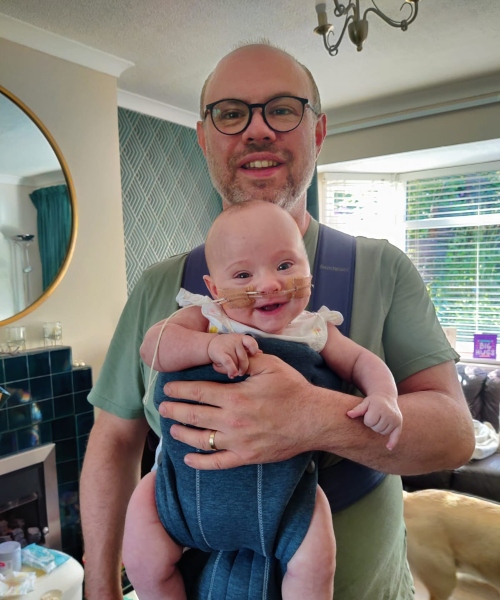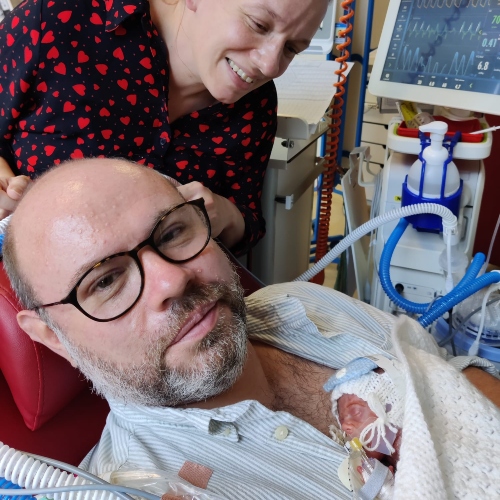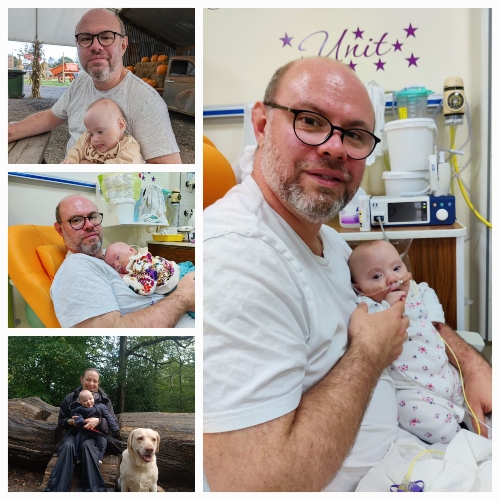Advice from a NICU Dad
NICU Dads | Mental Health
Laura was born at 25 weeks gestation at her local hospital. Day one is nothing you can prepare for and will feel like a blur. I have no advice for this day other than to get through it.
Take time to rest
Laura was born in the morning and by lunchtime, she had been moved to a Tier 3 hospital into Intensive Care/ICU. By this time neither mum nor I had slept for about 36 hours. We considered following Laura to the ICU but had very little left in the tank at this point. We spent the first night of Laura’s life at home, exhausted, shell-shocked and unsure of anything about our lives.
On reflection, I am glad we took that time to rest on that day. First contact with the ICU is very overwhelming and you find yourself launched into a world you do not know or understand. There is a lot of information to take on board very quickly, much of it is complex and of a technical nature.
I had the benefit of having a friend who had two premature babies previously. In some sense, I had someone to mentor me through the process and warn me of what was to lie ahead.
Find your role
I think it is a male inclination to try and do something productive to help. Some sort of task that assists or at least improves the situation. However, in the very earliest days, a lot of the work comes from the medical team and mum, with expressing breast milk if they are lucky enough to be able to do this. You can find yourself standing on the sidelines feeling powerless to alter the outcome.
However, early on I realised my role was going to be more of a support function. Supporting mum and to a lesser extent acting as the chronicler for this event. In time details of the event would be forgotten, so it was important to have some sort of record. In some dark realisation, I also thought each day that may be the last photo I ever got to take of Laura.
Life hangs in the balance but basic functions need to continue
I did this primarily through photos and video, which can be done without consuming a lot of time. Through this role, I was also able to act as the main point of communication between us and the rest of our family and friends. Providing updates and maintaining lines of communication with what feels like the outside world. Supporting Mum did not amount to many complicated tasks but simply doing the mundane, but time-consuming.
Despite what you are going through, the basic functions of life need to continue if you are going to transit through this period. The dog walks, the washing, the cooking, and cleaning all contribute to an easier passage.
Now I had found a role.
Communicate with your partner
The ability to communicate with your partner also becomes vitally important. No other person in existence will have quite the same understanding of what you are going through other than your partner at this time. Even then, their experience will differ.
I had no idea about the battle of expressing breast milk, but learned quickly. We were lucky enough to have a Breastfeeding Coach and access to hospital-grade breast pumps. It is a task Laura’s mum so desperately wanted to do for Laura. It was the one thing she could do to provide such a boost to Laura. As a result, Mum’s identity throughout this period became tied to the idea of being the milk factory. Her mental well-being in some ways became tethered to the milk output. This is great when things are going well but can be a terrible pressure when output is not as anticipated. So many factors can affect production, and we spent a great deal of time dealing with the impact of dips in supply.
One of the key issues is stress, which obviously can lead to a spiral of dwindling supply if not managed. In the support role I adopted, one of the things was doing things to keep the milk factory going. Feed mum well, with good nutrition, assist her mental well-being, help understand the reasons for a dip in supply (illness etc.), promote plenty of sleep and source breastfeeding supplements.
Consider renting a hospital-grade breast pump
One of the things I look back on that I would have done vastly differently was to rent a hospital-grade breast pump. We were lucky enough to be able to fund this but lacked the foresight to see its value. We bought domestically available options, and I consider this to be the biggest mistake we made. Eventually, we would rent one of the hospital-grade machines, and if you can spare the £50 per month, it can improve the quality of life for all concerned. It is more efficient and quicker, and as a result, reduces stress. This is the most practical advice I can offer in this discussion.
Look after yourself
I realise until now I have primarily talked about doing things for other people and support for others. I do feel though, that my ability to perform those tasks benefitted me. That is not to say your mental well-being can be rooted in servitude. Absolutely not.
In the early weeks, Laura’s mum fell ill and was admitted to a different hospital. I found myself in a routine of waking early, doing the dog walk, going to the hospital to see Mum, and collecting the supply of milk from overnight. Then visit the baby in another hospital and return home to see the dog, toilet and feed her. Then returning to the hospital to see Mum in the evening. The day started around 6 am and concluded around 9 pm. This routine lasted for about 5 days and was exhausting. In the long term, it would not have been sustainable. In between set tasks, the mundane domestic chores had to be maintained as well. It is because of this experience, I realised that being able to pace yourself was vitally important.
Pace yourself
When Laura was born, we had no idea how long we would be in hospital, and it is incredibly difficult to predict. Therefore in the early days of establishing a routine, longevity must be your guiding principle. It is not enough to say, “I can do this now”. You may need to be able to do this in 3 months, and still not be on the ropes, mentally and physically.
This was one of the first things my friend warned me about having been through premature birth twice. There is an inclination in the early days to spend as much time cot-side as you can. You feel that this is your place, and this is where you should be every waking hour.
However, we all have lives before these events take place and they are lives that must be maintained. There will be pressure from other various aspects of life to not be cot side, whether it be work, other children or commitments. There can also be a huge degree of guilt for not spending every available hour cot-side.
Keep in touch with the outside world
In some ways, if you have other children or some other factor in the outside world to anchor you away from the hospital it can be of great benefit. For me, that anchor was our dog. Honey and I walked every day, and that time spent outside in nature was of incredible value to decompress, to quietly consider the day before and the day ahead.
I would recommend finding time every day to do something that does not involve the hospital, and that you keep for yourself to maintain your well-being. Whether it is gaming, music, a boxset or an existing hobby. You need to keep in regular touch with the outside world.
Your time in NICU is a period in your life when you have the world's most advanced, highly trained and regulated babysitters in the world. You can take those hours to maintain yourself. The medical team know that when they take on a premature baby, they are taking on multiple patients. They are effectively looking after you to some degree as well.
Don’t be afraid to ask questions
In terms of life at the hospital, you begin to take on a whole new language. A lot of the information you receive from the medical team will involve words and phrases you have never previously encountered.
I was lucky that Laura’s mum worked in a science background and was able to clarify a lot of discussions with medical staff where I only had questions after the event. It may seem obvious but there is zero expectation on you to understand an entirely new world of paediatric medicine. Do not be afraid to ask staff to give you the “explain it like I'm five” version.
Being able to understand the issues that you are facing is hugely important. Becoming stressed about problems that you do not understand is something that can be avoided when you have effective communication with the staff caring for your baby.
Success is not a straight line but a journey with ups and downs
It may be tempting to research problems yourself online. I would advise against this. As the saying goes “a little knowledge is a dangerous thing”. To get the complete picture the best information is going to come from the medical staff.
Another trap you can fall into is finding that problems arise as events progress, and you begin to question why you were not told about issues at an earlier time. On reflection, if the medical staff had advised us about every problem and issue that was going to arise at the beginning of our journey, we may not have survived day one.
Dealing with premature babies does not start with a checklist on day one, that you can tick off as you go to a conclusion. Problems arise at various stages of development. Deal with the issues week to week and expect problems to arise as you go. On day one our consultant advised us this is going to be a roller coaster and that is correct.
Enjoy the good days, endure the bad days, and know both will pass in time.
Ask for support from your employer
Work. This is a relationship that may impact how you live your life more than any other at this time. I can only offer my experience and the benefits that I had as a result. At the time Laura was born, I was in a new job for about 6 weeks. I had no idea how this would work but fortunately, my boss was phenomenal.
The first week I was left to simply care for my family. The second week I established a routine of working from the hospital, working from home in the hospital setting, and going into the office one day a week. I expect my luck is rare, however. It was of incredible value to be able to feel connected to events at the hospital. To be able to be cot-side in minutes if I wanted to and still maintain a working life.
At home the real work begins
The most dangerous time I found for mental health was when you leave the hospital with your baby. Although this is an incredible milestone, this is also a time of great instability in events.
When you leave the hospital, there is an ingrained assumption from common experience, that you are well, fixed and ready to lead a normal life. The reality is that the baby has reached a point where they no longer require round-the-clock nursing. The parents can maintain the routine tasks of feeding, maintaining oxygen supplies, changing NG tubes etc. Those are two wildly different propositions. My friend had said to me as we approached discharge “now the real work begins”. This turned out to be true.
In a moment, you lose a lot of support and take on 24-hour care, rather than being able to do the hours you can. Your routine can be altered dramatically. Your nursing and medical support can fall away significantly and the difference between the service in a hospital setting compared to community-based nursing can be jarring.
It can feel like you have had the rug ripped out from under you and feelings of abandonment can arise. These are realities of our health care that you cannot alter, but if you can come to terms with that prospect before it happens, you can soften the blow.
Prematurity is not a battle about getting to that hospital exit, the trials can extend well into time at home. There are issues you cannot change, but you can consider.
1 in 4 dads will leave this process with PTSD
In conclusion, the journey is about looking out for yourself and those immediately beside you. Communicate as best you are able. The stresses and anxiety of this process are not something you can opt out of. It is a problem to be addressed with practical measures. It may not manifest itself for weeks or months but be assured it is there in the background of each day.
The best analogy I can give is that of a pot that we carry around, that can at some point overflow. The overflow can represent emotional outbursts, depression, anxiety or pressures of this event manifesting in some other undesirable way. Before this event, we all carry certain levels of stress and anxieties about everyday life in a pot. Hopefully, they do not overflow the pot. When a premature baby comes along, that pot becomes more full and closer to overflowing. It may not cause the pot to overflow in isolation, but certainly pushes the pot closer to that possibility. It may push it to the point where it only takes a minor event or series of events to push things to the point where the pot does overflow.
We can find ourselves acting irrationally, more irritable, depressive episodes, but out of character. You may even question why the trigger event appears to have had such a disproportionate effect on your well-being or behaviour. It is at this point you can look at this trigger event and give it an undue weighting to explain your reaction. We can believe that the minor event has greater importance than it has and lose touch with the reality of the situation. It is important to remember the pot. A pot does not overflow because of the last teaspoon of water that is added to it. It is due to everything else it has been struggling to contain. Once we acknowledge this, we can pause to consider what we are dealing with. It is not a flat tyre, or a bin not being emptied, but something deeper rooted, and of greater significance than we have given it credit for.
Talk about it
It may be important to recognise our limits in terms of our mental health. In terms of what can be done to protect yourself, there will be some steps that can be taken, some of which I've mentioned above already.
Talking to friends and family can help. This however can have limitations in terms of relaying an experience that is relatively unique and unrelatable to some people. To this end, there may also be value in seeking out peer support as I found. Parents currently going through the NICU journey can share their experience with the parents who've previously been through it. In more formal terms many NICU settings have psychologist services available. GPs can refer to talking therapies such as cognitive behavioural therapy, which our household has benefitted from previously. In some cases, you may be able to self-refer.
Ickle Pickles offers NICU support and our coffee mornings are free to attend and make a big difference to families with babies in neonatal intensive care. We also run events for NICU Men, friendly get-togethers to share our stories with other NICU dads or NICU relatives.
Contact our Head of Peer Support Julie at [email protected] to find out more.




















.webp)
.webp)
.png)
